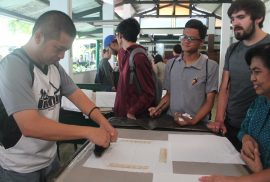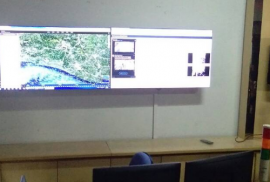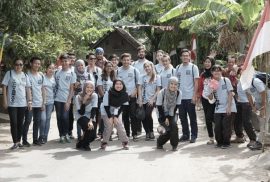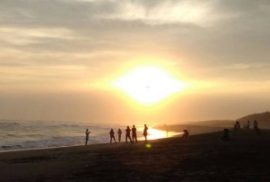At day seventh of the Eco-DRR summer course it was finally time for the, with high expectations looked for, Batik craft workshop and “Amazing Race”. The participants met up at the common hotel as it was by now usual on a fieldtrip day. This time although, no bus was used, but instead the people were expected to group wise order a cab in order to get to first and later to the second destination. This could already be seen as a warming-up part of the amazing race as the groups would travel together and independently throughout the day. But the groups were not fully without support and did receive a letter with 50 000 IR for each group member, to be used wisely for transportation and food during the day. Some participants and the people from the organization committee decided to use the scooter instead, as it for sure can be said to be the smoothest mean of transportation in Yogyakarta.
Summercourse 2017 Daily Activity
We woke up around 6 am knowing that it is another field trip to visit E-Pujiono Learning Center. Piujiono Learning center is non- Profit organization established by Indonesian Disaster Management Practitioners as a new modalities, institutional arrangements, and a platform for acquiring, sharing and disseminating knowledge on disaster and climate change to support evidence-based policy making in Disaster Management and Climate change Adaptation.
We left Cakra Kusuma Hotel around 8:45am and we arrived the venue of E-Pujiono Learning Center almost 9;30 am. Dr. Puji Pujiono founder of the Learning Center welcomed us in the “Joglo” an Indonesian communal space to entertain guest, usually rich people has joglo in their houses. He discussed his involvement with the development of DRR Framework and how it is evolved within thirty years. He also mentioned that E-Pojiono is his tribute to his wife who built the Learning Center with him, Mrs Pojiono died of Cancer. The place is like Taj Majal, this promote resilience in Dialogue; Preach and create platforms for dialogue so people can talk and share their views and they try to capitalized with social platforms like twitter and facebook.
Day 6 of Summer Eco-DDR continues, despite weekend, but the course comprises of full-days weekend-included planned activities that will be on-going consecutively for the next 2 weeks, which means that Saturday and Sunday too will have activities planned for us by the committee. If weekdays we would have classes and theoretical practices, weekend means going out, trip, sightseeing, fresh air, outdoor, travelling.. you name it. At least it isn’t going to be a boring day for me, and a trip of endless sightseeing to places that I have never been is just perfect.
As usual the class starts at 9 am and we start a new day with eagerness. The days started with a lecture from Dr. Arry Retnowati from the Centre of Disaster Studies, Gadjah Mada University. Dr, Arry is gruesome about the economy and agriculture in Yogyakarta. For your information, the beach area in Yogyakarta is 113 km long and the Bantul area is 23 km long. She also giving a presentation about the coastal management in Parangtritis by using new approach to ecological system. They also enhanced their activities to tourism sector in that area.
Day 5, Friday, started off differently: We were divided in groups and sat down with our new teammates, which was nice, as it encourages interaction with more people. Dr. Arry Retnowati of the UGM replaced Dr. Radiya Jati’s speech about Disaster and Public Policy as our first lecture. She expanded on what we learned yesterday at the Parangtritis Geomaritime Science Park, though her focus was more on the river feeding into the sea there and the different problems that come with it, both natural and man-made. Natural problems include floods, riverside erosion, and transportation of sediments; men-made ones include faming, husbandry, mining, increased population in the area and all the different types of pollution and changes in the environment, including deforestation, that come with it. Then, each group choose a country and there a river to investigate the different problems that happen upstream, middle stream and downstream, as there often are distinct patterns to what type of pollution or other hazards can be found in which area. The chosen areas included Boracay Island, Philippines; Malacca, Malaysia; Ystad, Sweden and Davao del Norte, Philippines. Some presentations were more extensive, while others really embodied the “short and sweet” stereotype. During the Q & A session afterwards, Mr. Arindam Chowdhury, a fellow participant of the class from India, gave a very detailed explanation on fluvial geomorphology and the theory of the normal cycle of erosion – namely the stages of a river course and types of watersheds. It was basically an impromptu presentation, which was quite impressive and shows his passion for his chosen field of study.
It’s the 4th day of the ECODDR summer course, and today was a special day for us. After a series of the so-called ‘theoretical’ classes for the past days, today was the day where we’re having our ‘practical’ classes. Practical as in, to see, to feel and to believe with our own senses, of what we had learned before during the classes. But I’d rather call it a happy sightseeing trip. We wore the t-shirt that we received yesterday, and yes it looked a bit oversized on me, but that didn’t matter. For what matters was the ‘oversized’ experience that I am about to feel, experience and enjoy.
The first fieldtrip of the course started early. At 8h the participants were ont heir way to Puton Village, where they were greeted with traditional singing and playing of instruments before they embarked on cycling tour, with typical Indonesians bikes known as “ontel”, around the village.
Puton was one of the villages which was most impacted by the 2006 earthquake. The water pond the students were in front of was the center of the earthquake, the cracks it left were filled by water. Because they had a limited early warning system, approximately 90% of houses were damaged.
Today starts the 3rd day of the EcoDDR summer classes, and after a bright and not-so-early wake up, I went to prepare myself for another great day and lectures to look forward to. It first started with such a great breakfast that i had, before me and my friends walked together, while discussing among ourselves about the topics that we learned on day 1 and 2. We arrived at the faculty building like after 10 minutes of walking, and went into the lecture’s hall, and waited before our first class starts.
Day three of the Eco-DRR summer course 2017. The participants have surely had a bit of time to adjust to the daily routines by now. First of to start the first session of the day was Dr. Bevaola Kusumasari, enlightening the students about Disaster and Public Policy. On the example of what to do with the problem of people throwing away rubbish in Indonesia, she tried to explain the purpose and meaning of public policy. The main topic of the lecture then crystallized to be the response of the central government to the major disaster in Indonesia during the 2000s which comprises several steps taken towards a disaster management law and disaster management agencies such as the BNPB. Nevertheless, in the light of this development Bevaola Kusumasari pointed to the importance of considering local capacity. This also includes attention given to local culture, making local people appropriate to take action. Another interesting fact presented in relation to this is the religious or spiritual interpretation given to disaster, with the potential of influencing the response.
Day two of the summer course could be introduced with the two key terms “urban planning” and “case study”. These describe the broader content of all four lectures today dealing with the context of Malaysia, Thailand, Japan and Indonesia. Another interesting thing to notice was the included definitions of key words such as disaster, risk, vulnerability and capacity in most lectures. This makes sense though, if one considers that there exists several kind of definitions and people use different ones.





